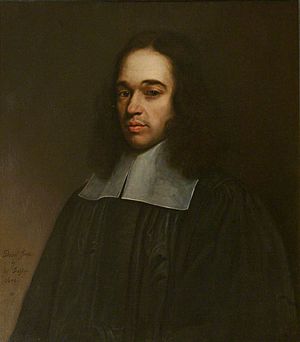Robert South facts for kids

Robert South (born September 4, 1634 – died July 8, 1716) was an English church leader. He was well-known for his strong, sometimes fiery, speeches and his Latin poems.
Contents
Robert South's Early Life
Robert South was born in Hackney, Middlesex. His father, also named Robert South, was a merchant in London. His mother was Elizabeth Berry.
He went to school at Westminster School and later studied at Christ Church, Oxford. He joined Oxford University in December 1651.
While at Oxford, he wrote a poem in Latin praising Oliver Cromwell. This was after a peace agreement ended the First Anglo-Dutch War in 1654. He earned his first degree in 1655.
Robert South was a strong supporter of the Book of Common Prayer. This was a prayer book used by the Church of England. Because of this, John Owen, a dean at his college, tried to stop him from getting his master's degree. But South still got his M.A. in 1657.
Around 1658, he became a priest in a private ceremony. He also traveled in Europe. In 1659, he gave a sermon (a religious speech) where he made fun of a group called the Independents. This showed the humor he would become famous for. In another sermon in 1660, he also criticized the Presbyterians.
Serving King Charles II
In 1660, Robert South became the "public orator" for Oxford University. This meant he gave official speeches for the university. He held this job until 1677.
Edward Hyde, 1st Earl of Clarendon, a powerful government official, made South his chaplain (a religious advisor). This was because of a speech South gave for Clarendon. In 1663, South became a "prebendary" at Westminster, which is a type of church official. He also earned his B.D. and D.D. degrees (advanced religious degrees).
Some people thought South changed his opinions to gain power. They tried to stop him from getting his degrees, but he succeeded. In 1667, Clarendon gave him a church job in Llanrhaiadr-y-Mochnant, Denbighshire. This job paid him money but didn't require much work. After Clarendon lost power, South became a chaplain to James, Duke of York, who was the king's brother.
In 1669, South made fun of the Royal Society, a group of scientists, in a speech. This led to a disagreement with John Wallis, a famous mathematician. In 1670, South became a "canon" at Christ Church, another church position.
South strongly believed that people should always obey the king. He was against the Toleration Act, which allowed different religious groups to worship freely. He spoke out strongly against various non-Church of England groups.
In 1676, he became a chaplain to Lawrence Hyde, Earl of Rochester, who was an ambassador to the king of Poland. South wrote a letter about his trip to Dantzic in 1677. In 1678, he became the rector (head priest) of Islip, Oxfordshire.
He lived in Caversham, near Reading, Berkshire. Robert South was a chaplain to King Charles II, but the king did not give him many other special jobs.
During King James II's Rule
When James II became king, Robert South was offered a high church position in Ireland. However, King James II did not want South to be part of a discussion between Anglican and Catholic church leaders. Instead, Simon Patrick was chosen.
Under William and Mary
After the Glorious Revolution, when King James II was replaced by William and Mary, South was unsure about supporting the new rulers. He eventually took an oath to support them. He believed that King James's leaving the country meant he had given up his throne.
South is said to have turned down a high church position that became available. He was also against a plan to bring different religious groups into the Church of England.
In 1693, South wrote anonymously against William Sherlock, another church leader. South accused Sherlock of having wrong ideas about the Trinity (the Christian belief in God as Father, Son, and Holy Spirit). This argument became very public and even involved the king, who asked them to stop.
During Queen Anne's Reign
For most of Queen Anne's rule, Robert South was quieter because his health was not good. However, in 1710, he spoke out in support of the High Church side during the case of Henry Sacheverell, a preacher.
When Thomas Sprat, a bishop, died in 1713, South was offered two important church jobs: Bishop of Rochester and Dean of Westminster. But he turned them down.
Robert South died in Westminster on July 8, 1716. He was buried in Westminster Abbey. He had asked to be buried near Richard Busby, his old teacher. His tomb has a large white marble statue of him.
Robert South's Writings
Robert South published many sermons. These were collected into six books in 1692. A second edition came out in 1715, while he was still alive. Later editions were also published.
His Latin works, called Opera posthuma Latina, were published in 1717. These included his will, his Latin poems (like the famous Musica incantans about the power of music), and his speeches as public orator.
People often praised Robert South for his quick wit and humor. One story tells of him giving a sermon to King Charles II. He noticed everyone in the audience had fallen asleep. He stopped and called out to Lord Lauderdale, who woke up. South calmly said, "My Lord, I am sorry to interrupt your rest, but please do not snore so loudly, or you might wake His Majesty!" Then he continued his speech as if nothing had happened.
 | Jessica Watkins |
 | Robert Henry Lawrence Jr. |
 | Mae Jemison |
 | Sian Proctor |
 | Guion Bluford |

